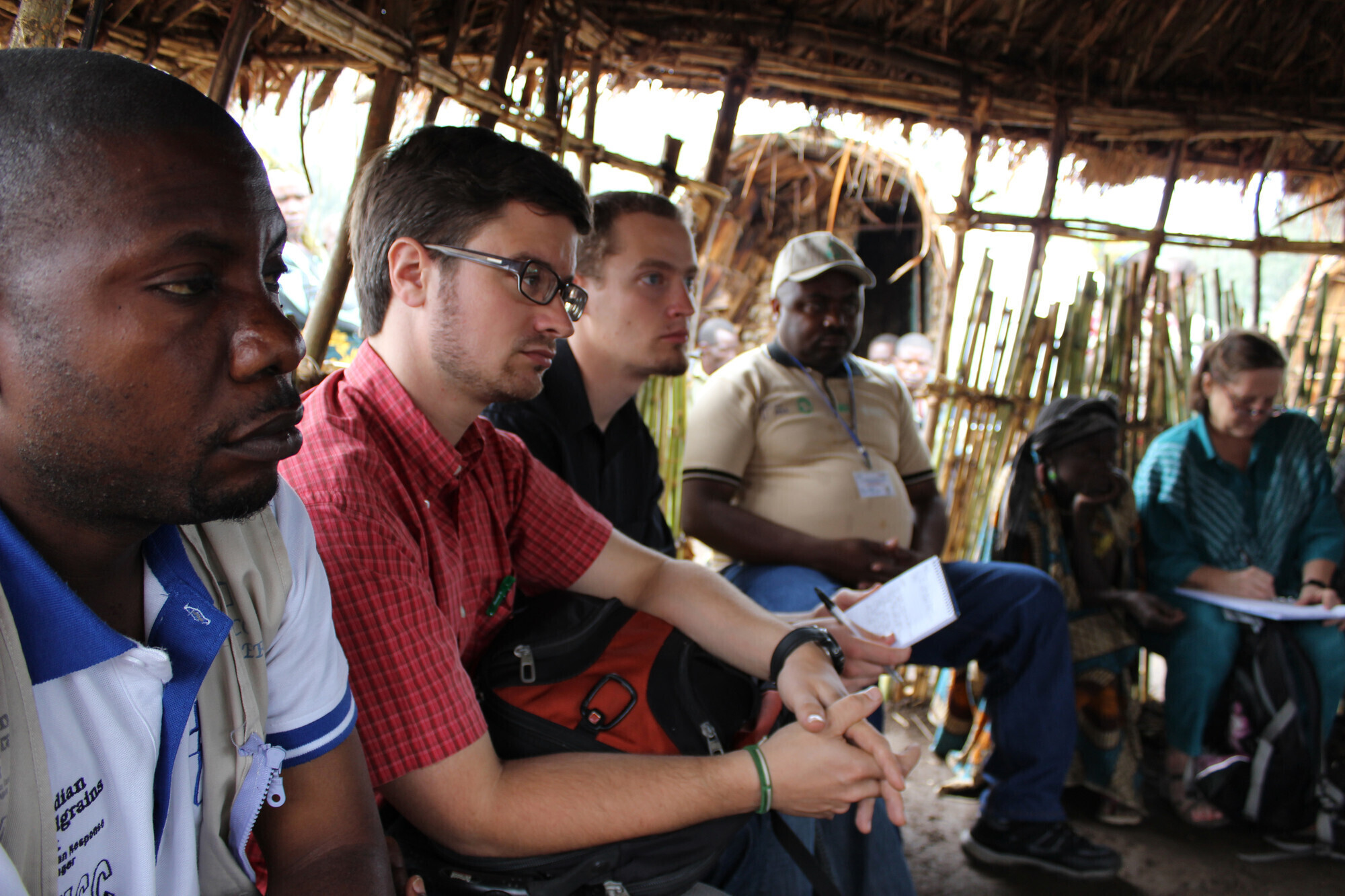Disarming conflict through listening

In the Democratic Republic of the Congo (DR Congo), courageous Congolese including church leaders have worked for years, going into risky places to disarm rebels and seek truth about violence. Joining those Congolese leaders in this work was Michael J. Sharp, a young MCC worker who later worked as a United Nations expert in DR Congo. In 2017 Sharp and his UN colleague Zaida Catalán were ambushed and murdered by unknown assailants in DR Congo. Their interpreter, Betu Tshintela, also may have been killed, but today he and three motorbike drivers are still missing, according to conflicting news sources. Read this Reuters article about the search for the truth about the murders of Sharp and Catalán.
This article about Sharp is adapted from the book Disarmed: The Radical Life and Legacy of Michael “MJ” Sharp, by Marshall V. King.
John Paul Lederach, a Mennonite and a longtime international peacebuilder, compares peacebuilding to tunneling through a volcano. “Pacifism doesn’t make any sense if you are removed from where the challenges are,” he explained to the author.
In his early 30’s, Michael “MJ” Sharp lived and worked among militia groups in the Democratic Republic of the Congo (DR Congo) who had chosen weapons, and regularly travelled to meet with leaders of armed groups in North and South Kivu.
These weren’t highly formal meetings. As National Public Radio reporter Greg Warner described it, “Not far from the lake were rebel-held forests, where every few weeks Sharp would walk, unarmed, to the base of a particularly fearsome rebel group called the FDLR. And there he would sit in the shade of banana trees to drink tea, practice his Swahili, and listen to these rebel stories.”
The story quotes MJ talking about building relationships and trust to bring about peace. “You can always listen,” MJ said. “You can always listen to people who want a chance to talk about how they see the world.”
A few months after arriving in the DR Congo in 2013, MJ had walked with three Congolese colleagues for two hours to meet with a high-ranking FDLR leader.
Serge Lungele and Bishop Bulambo Lembelembre Josué of the Peace and Reconciliation Program remember the meeting.
“Have you ever met an FDLR before?” the colonel asked.
“No,” said MJ. “This is the first time.”
“What do you see? Are they human beings or are they animals?”
“I see they are human beings, as we are.”
The officer favored repatriation but said that some of the other officers didn’t. He saw value in letting some go home, including the sick, women whose husbands had been killed in fighting or those who no longer wanted to fight.
MJ asked the man why he was willing to work with them and let people leave and go back to Rwanda The lieutenant colonial said that 90% of the current FDLR fighters were less than 10 years old in 1994 when the genocide occurred. He said the genocidaires should be tried in an international criminal court including those in the current regime in Kigali. “We’re tired. We’re ready to go home,” the man said.
MJ listened. In his trip report, MJ included a photo of himself with four armed FDLR fighters. The lieutenant colonel urged MJ to be their spokesperson in the world, to tell people what was really happening. “Michael, we are human beings. Don’t think we are animals,” he said.
On another trip, a militia leader told MJ that white people bring wars to DR Congo. Rwanda had invaded DR Congo and killed people, but no one had come to help, the leader said.
MJ was calm. He asked for permission to talk.
He asked the leader if he has really killed 25 officers.
He explained that he was there to demobilize combatants. He explained that fewer people arming themselves and using violence to solve a problem would help everyone.
“Every place we went with Michael, he was always finding a way to connect with those warlords,” said Moise.
MJ would listen to the rebels, sometimes as they told of the magic gris-gris they believed protected them from bullets.
MJ also challenged them. In one meeting, MJ pointed out that the militia was burning and doing damage in the region. “So you’re using violence against violence,” MJ told the leader.
The chief with whom he was meeting said he couldn’t control everyone and that there had been miscommunication, that he needed to talk to the other side to make peace. MJ said he needed agreement from the leader to go to the other side and help work for peace. The leader agreed to participate in a process as long as the government wasn’t part of it and MJ wouldn’t side with the enemy.
As MJ left MCC, he completed a white paper entitled “FDLR Narratives.” In it he explained that the FDLR had been seen as “a spoiler to regional peace initiatives” since the mid-1990s and that he wanted to write about the group to shed light on the thinking of those in it to “prevent misunderstanding or situations that can destroy a process or put a practitioner in danger,” and point to peacebuilding strategies.
Peacebuilders, says John Paul Lederach, have to offer alternatives to violence. “What you’re trying to figure out is ways that can be reduced and stopped and trying to provide protection to the most vulnerable. What it means is making relationships with people who are very different from you.”
Adapted from Disarmed: The Radical Life and Legacy of Michael “MJ” Sharp by Marshall V. King (Herald Press, 2022). All rights reserved. Used with permission.
Top Photo: Michael J. Sharp, second from left, participates in a 2013 meeting at camp for internally displaced people in the town of Shasha, North Kivu, Eastern Congo. Photo courtesy of Timothy Lind

